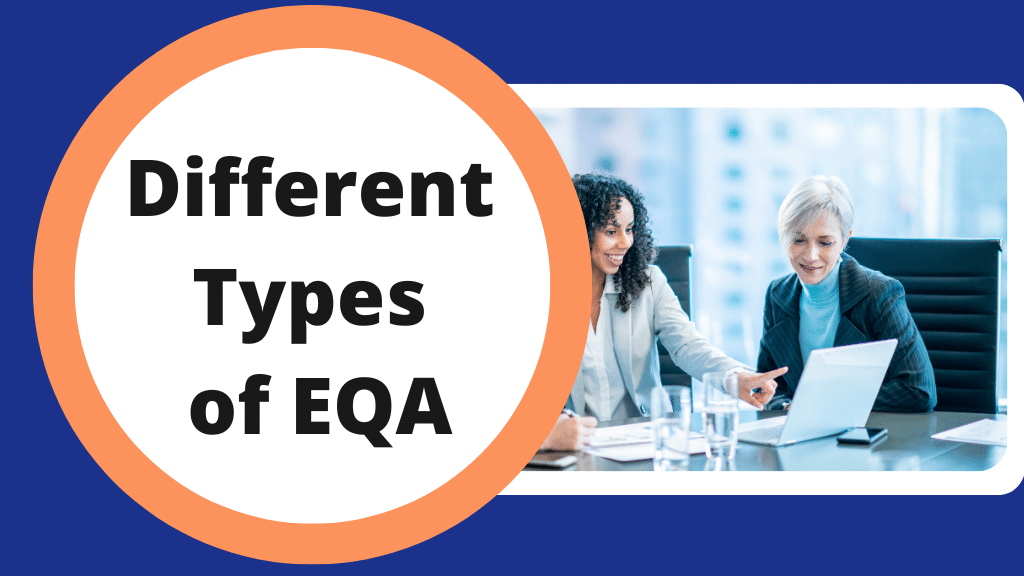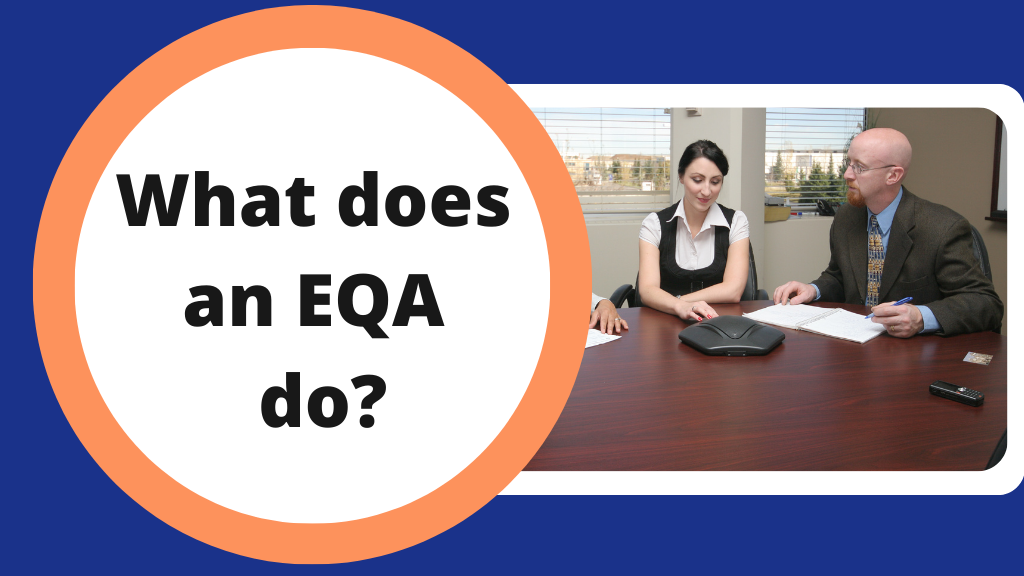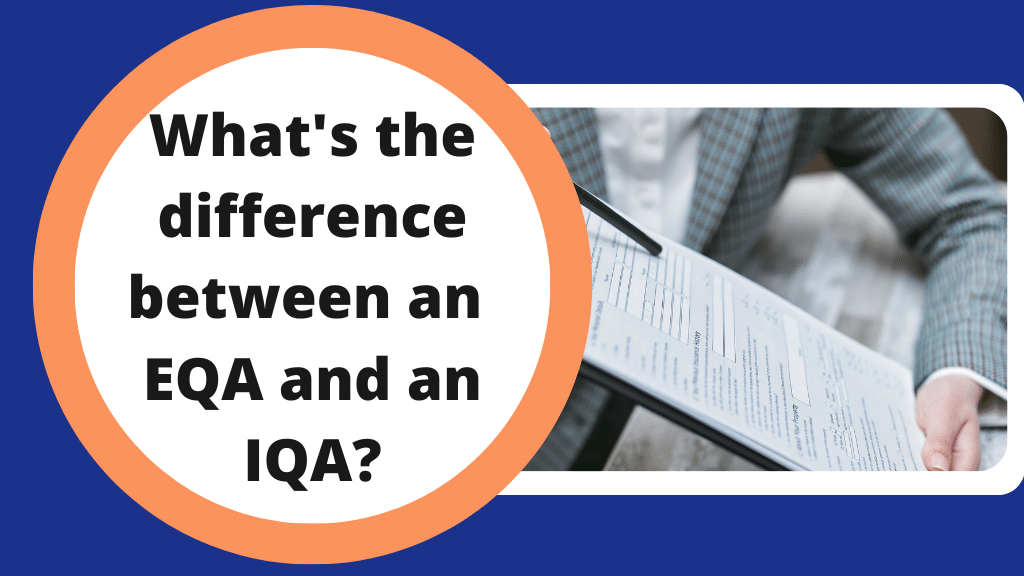December 3, 2024
The Different Types of External Quality Assurance Work

If you’re thinking about becoming an External Quality Assurer (EQA), you might be surprised at the variety of different types of external quality assurance work involved. From sampling learners’ work to supporting training providers to implement improvement, EQA work covers a broad range of activities that make it both challenging and rewarding.
Why does External Quality Assurance (EQA) matter?
The role of an External Quality Assurer (EQA) is essential for maintaining high standards in education and training. EQAs are employed by Awarding Organisations to make sure that training companies, colleges and other approved centres meet the organisation’s established standards. In the past, this role has been referred to by other titles such as External Verifier or Moderator.
The Different Types of External Quality Assurance Work
EQA work requires a holistic approach to quality assurance. It’s not just about ticking boxes to check if a centre meets the rules; it’s about looking at the bigger picture to make certain that learners are treated fairly, assessment methods stay consistent, and qualifications keep their credibility.
Traditional External Verification
Traditional external verification is what most people think of when they hear “EQA”, perhaps in the form of a dour-looking inspector peering at with a frowning face. Although visiting training centres is the bread and butter of external quality assurance work, don’t let the word “traditional” fool you – it’s a modern process!
An EQA visit focuses on evaluating training providers and assessment centres to review how assessments are done, how internal quality assurance (IQA) is managed, and how their learners progress from when they start to when they qualify.
External Quality Assurers (EQAs) are not just inspectors. They are critical in supporting assessment centres. Through feedback, practical advice and guidance to assessors and IQAs (Internal Quality Assurers), the EQA process helps training providers raise their standards and deliver better outcomes for learners. For a lot of EQAs, seeing growth and development in the centres they support is one of the most satisfying parts of their role.
Remote Quality Assurance
Remote external quality assurance was gaining traction before the recent shifts to remote working, and now it’s an essential part of the EQA’s work. For EQAs, this can involve conducting reviews of electronic evidence, virtual meetings with assessment teams, and online sampling of learner work.
This approach allows EQAs to review materials at their own pace, schedule virtual meetings to suit the centre staff, and reduce travel time while maintaining high standards of scrutiny, making it a lot more efficient and flexible for everyone involved.
Sampling and Reviews
Sampling and reviews are a central part of external quality assurance and bring a deeper level of scrutiny to the process. This involves carefully examining how centres run their operations, focusing on how candidates are assessed and whether these practices meet the standards set by the Awarding Organisation.
The process may include looking at how providers manage reasonable adjustments and verifying they’ve planned assessments in a way that meets candidates’ specific needs. It also involves checking whether any required actions from previous EQA visits have been completed, ensuring ongoing compliance and improvement.
Risk-Based Quality Assurance
A lot of EQA work involves identifying ways to reduce risks to qualification integrity so candidates do not gain qualifications unfairly or fail when they should succeed.
Assessments need to be conducted fairly, and assessment records must be accurate and overseen by qualified IQAs, and the centre’s internal quality assurance systems are examined to assess their effectiveness and suitability. This approach often involves reviewing candidates’ portfolios, interviewing both candidates and assessors and observing assessments in action.
Supporting New Centres
An important aspect of external quality assurance is visiting and supporting new centres to establish good practices to deliver qualifications effectively. These centres may include organisations new to offering courses, providers transitioning to a new Awarding Body, or existing centres adding a new qualification for the first time.
External quality assurance for these centres begins with thoroughly evaluating the centre’s capacity, skills, resources, and staff. This includes checking their ability to recruit suitable candidates, provide proper training, and conduct fair assessments. The focus is on validating that the centre has rigorous internal assessment and quality assurance systems capable of running smoothly and meeting the required standards.
This can be challenging and rewarding for EQAs, as their actions and decisions directly impact the organisation they are assessing, including their staff, managers, Internal Quality Assurers and candidates.
Ready to start or advance your career in External Quality Assurance?
EQAs are rarely limited to one type of quality assurance work, so it’s never just another day in the office. Most EQAs combine different approaches to their work depending on the needs of the Awarding Organisation they work with, the centres they are dealing with, and their own expertise. As a result, a career that combines interpersonal skills, professional expertise and continuous learning.
Ready to take the next step? No matter if you’re starting out or looking to move your career forward, we’ve got the right course for you:
This theory-based course is a great introduction to external quality assurance activities and the perfect way to build your knowledge as you move into this field.
Level 4 Award in External Quality Assurance of Assessment Processes and Practice
Ready for a full EQA qualification? This course is designed for anyone looking to start or advance their career in external quality assurance.
Next ›‹ Previous
Back to Blog








